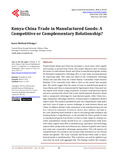| dc.contributor.author | Githaiga, Nancy M. | |
| dc.date.accessioned | 2021-04-30T10:13:07Z | |
| dc.date.available | 2021-04-30T10:13:07Z | |
| dc.date.issued | 2021-03 | |
| dc.identifier.citation | Open Journal of Social Sciences Vol.09 No.03(2021), Article ID:107692,22 pages 10.4236/jss.2021.93007 | en_US |
| dc.identifier.issn | 2327-5960 | |
| dc.identifier.uri | https://m.scirp.org/papers/abstract/107692 | |
| dc.identifier.uri | https://www.eduzhai.net/4048-kenya-china-trade-in-manufactured-goods-a-competitive-fileshare | |
| dc.identifier.uri | http://hdl.handle.net/123456789/4635 | |
| dc.description.abstract | Trade between Kenya and China has increased in recent years, with a significant increase in imports from China. This study’s objectives were to examine the nature of trade between Kenya and China in manufactured goods, analyze the Revealed Comparative Advantage (R.C.A.) and make recommendations for improving trade. This study was based on the Comparative Advantage Theory and used data from the United Nations Commodity Trade Statistics Database (U.N. Comtrade) from 1984 to 2015, as this period had complete data. The results suggest that the nature of trade in manufactured goods between Kenya and China is characterized by high imports from China and very low exports from Kenya-a large proportion of Kenya’s manufactured exports end up in countries with which it has a clear trade framework. Moreover, Kenya lacks a comparative advantage for manufactured goods, while China has a high comparative advantage; therefore, Chinese exports complement Kenya’s import needs. The research identified the lack of a comprehensive trade policy and strict rules of origin as serious challenges to trade between Kenya and China. In addition, Kenya’s trade orientation in the manufacturing sector has been reduced by inadequate investment, limited value addition, and high labor costs. Resolving these obstacles is vital to overcoming trade imbalance and boosting Kenya’s competitiveness, as the potential for future growth in trade in manufactured goods from Kenya to China is weak, based on existing economic specialization. Kenya should focus on a comprehensive trade policy with China, support more FDI in manufacturing, innovation, and technology, improve labor productivity and infrastructure, enhance its global value chains, and create new comparative advantages among others. This will improve the competitiveness of its products and increase trade orientation on the Chinese market and globally. The study concludes that Kenya-China trade in manufactured goods is complementary. This conclusion can only be applied in genera since the study used aggregate data. The findings confirm the Comparative Advantage theory that countries export what they have in abundance and import goods that they cannot produce effectively. | en_US |
| dc.language.iso | en | en_US |
| dc.subject | Kenya-China Trade, Manufactured Goods, Revealed Comparative Advantage, Nature of Trade, Competition | en_US |
| dc.title | Kenya-China Trade in Manufactured Goods: A Competitive or Complementary Relationship? | en_US |
| dc.type | Article | en_US |

